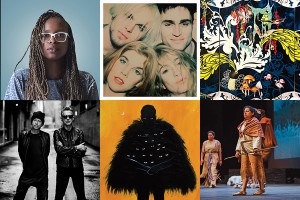The Death of a Love Affair with Music
The first time I fell in love with The Go-Gos, I was a lost and lonely teenager in need of a dream world to escape into. The second time, on Sunday night, I was a mother fleeing my family for a night out with friends at The Wilbur.
As soon as the show started, I realized how much I’d forgotten — the addictiveness of the band’s guitar-heavy pop, the cleverness of the band’s lyrics about love and loss and broken dreams, the coolness of their off-kilter fashion choices, and — my God! — the total, wonderful kookiness of Belinda Carlisle and bad-ass smirks of her devilish counterpart, Jane Wiedlin. Even now, all five of the band members, who are well into their fifties, sport combat boots and fishnets and sling guitars over their shoulders with wide, gleaming bands of rhinestones. When Carlisle belted out the words, “Pay no mind to what they say, in the jealous games people play,” and then fluttered barefoot around the stage like some tripped-out gypsy, all I could think was: “What’s not to love here?”
I wasn’t alone. Across the theater, men, women, even children, were singing every word to every song, dancing, clapping, and waving wildly. We swayed in our seats until, at last, the people in front of us stood up and we could dance, with abandon, standing up. How had I forgotten all of this?
When I was 13 and lying on my bedroom floor, staring up at the ceiling for hours on end, it didn’t occur to me that The Go-Go’s were anything more than a catchy pop band with a subtle undercurrent of darkness — precisely what any teenager needs for whiling away the empty hours after school. I didn’t realize what music — and in particular New Wave music — meant to me. I just knew that I needed it, like air, to breathe. When the words, “This town is our town, it is so glamorous. Bet you’d live here if you could and be one of us,” blared out of my speakers, the possibility of a life bigger than the one I was living welled up inside me. Thirty years later, it’s not a feeling I have all that often, and my interest in music is nearly nonexistent.
But on Mother’s Day, with The Go-Go’s themselves whirling, stomping, strumming, and belting out hit after hit not 20 feet in front of me, I did the only thing that made sense: I danced my face off, sang every word to every song I could remember, then garbled the rest, sometimes just shouting random utterances until I could find the chorus again. It didn’t matter. Everyone around me was doing the same. And when the show was over and the lights came on, I was sweaty and exhilarated, my voice hoarse and my body spent as it had been after concerts all those years ago.
As my friends and I reluctantly left the theater, I reached into my purse to dig out my Charlie Card. Instead my hand grabbed a three-inch hunk of orange rock that my nine-year-old son had sanded down and oiled to perfect smoothness in his art class at school. He’d handed it to me in the car earlier that night, saying, almost shyly, “Here. It’s for you. For Mother’s Day.” I’d thanked him and put it in my purse and now, my ears still ringing, I gripped it as we walked to the T. I realized what had changed. Though I missed my teenage devotion to music, I no longer needed it to breathe.


